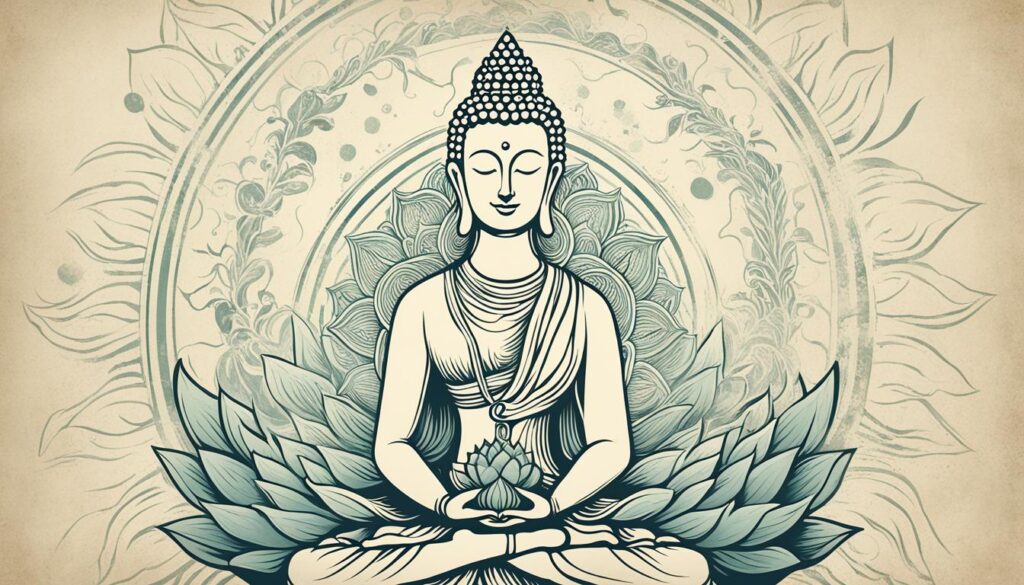“Happiness is not something ready-made. It comes from your own actions.” – Dalai Lama
Welcome to the enlightening world of Buddhism, where timeless wisdom awaits those who seek serenity amidst the chaos of life. As one of the world’s major religions, Buddhism offers profound teachings and core principles that guide individuals towards inner peace, mindfulness, and compassion. With its emphasis on understanding the nature of suffering, following the Eightfold Path, practicing mindfulness, compassion, detachment, and embracing change, Buddhism provides a transformative philosophy that resonates with people of diverse backgrounds and beliefs.
In this article, we will explore the fundamental doctrines and central tenets of Buddhism, delving into the key beliefs and practices that can enhance your spiritual journey and bring tranquility to your everyday life.
Key Takeaways:
- Recognize that true happiness stems from your own actions and choices.
- Buddhist teachings provide a pathway to embrace serenity amidst the chaos of life.
- Understanding the nature of suffering is essential for finding peace.
- The Eightfold Path serves as a practical guide to ethical and mindful living.
- Mindfulness, compassion, detachment, and embracing change are crucial aspects of Buddhist philosophy.
Understanding the Nature of Suffering: The Four Noble Truths
In the teachings of Buddhism, the understanding of suffering is considered essential on the path to enlightenment. Buddha taught that suffering (known as Dukkha) arises from desire and attachment. In today’s fast-paced world, this recognition of the source of suffering is more relevant than ever.
The Four Noble Truths provide a framework for comprehending the nature of suffering and discovering inner peace. They serve as a guiding light, illuminating the path towards liberation and serenity. Let’s explore these profound truths:
- The Truth of Suffering: Suffering is an inherent part of life. It encompasses physical pain, emotional distress, and even the dissatisfaction that arises from constant craving and longing.
- The Truth of the Origin of Suffering: The cause of suffering lies in desire and attachment. Our insatiable cravings and clinging to impermanent things lead to frustration, disappointment, and suffering.
- The Truth of the Cessation of Suffering: It is possible to attain liberation from suffering by eliminating desire and attachment. By letting go of our clinging and embracing impermanence, we can find peace and freedom.
- The Truth of the Path to the Cessation of Suffering: The Eightfold Path, consisting of right understanding, right thought, right speech, right action, right livelihood, right effort, right mindfulness, and right concentration, offers a practical guide on how to overcome suffering and achieve enlightenment.
By understanding the nature of suffering and acknowledging its origins in desire and attachment, we can break free from the cycle of discontentment and find true peace within ourselves. The Four Noble Truths provide us with profound wisdom to navigate life’s challenges and cultivate serenity.

| Noble Truth | Description |
|---|---|
| The Truth of Suffering | Suffering is an integral part of existence, encompassing physical pain, emotional distress, and dissatisfaction arising from desire and attachment. |
| The Truth of the Origin of Suffering | Suffering arises from desire and attachment, as we relentlessly pursue transient pleasures and cling to fleeting experiences. |
| The Truth of the Cessation of Suffering | Suffering can end through the elimination of desire and attachment, by embracing impermanence and finding contentment in the present moment. |
| The Truth of the Path to the Cessation of Suffering | The Eightfold Path offers a practical roadmap to alleviate suffering, guiding individuals towards right understanding, thought, speech, action, livelihood, effort, mindfulness, and concentration. |
The Path to Peace: The Eightfold Path
The Eightfold Path is a central teaching of Buddhism and serves as a practical guide to ethical and mindful living.
It encompasses eight interconnected principles that provide a comprehensive framework for navigating life’s challenges with wisdom and compassion. By following the Eightfold Path, individuals can cultivate inner peace and harmony while making positive contributions to the world.
1. Right Understanding
Develop a clear and accurate understanding of the nature of reality and the causes of suffering.
Right Understanding involves gaining insight into the interconnectedness of all things, understanding the impermanence of life, and recognizing the consequences of our actions.
2. Right Intent
Cultivate positive intentions and motivations that align with ethical principles.
Right Intent emphasizes the importance of cultivating intentions rooted in kindness, compassion, and goodwill towards oneself and others. By cultivating wholesome intentions, we sow seeds of peace and create positive outcomes in our lives.
3. Right Speech
Use words mindfully and consciously by promoting honesty, kindness, and non-harming.
Right Speech encourages the use of truthful, kind, and constructive words that nurture harmony and understanding. It entails refraining from lying, gossiping, harsh or hurtful speech, and engaging in divisive conversations.
4. Right Action
Engage in actions that promote well-being, non-violence, and kindness.
Right Action involves acting ethically and with integrity, refraining from actions that cause harm to oneself or others. It includes practicing non-violence, refraining from stealing, and honoring commitments.
5. Right Livelihood
Choose a livelihood that aligns with one’s values and promotes the welfare of others.
Right Livelihood emphasizes the importance of engaging in ethical professions that do not cause harm or exploit others. It encourages individuals to pursue careers that promote well-being, compassion, and the greater good of society.
6. Right Effort
Cultivate diligent effort in overcoming unwholesome thoughts and behaviors, while nurturing wholesome ones.
Right Effort involves directing our energy towards letting go of negative patterns of thinking and behavior while cultivating positive qualities and habits. It requires perseverance, self-discipline, and a commitment to personal growth and transformation.
7. Right Mindfulness
Cultivate present-moment awareness and non-judgmental observation of thoughts, emotions, and experiences.
Right Mindfulness involves developing a deep awareness of our internal and external experiences with an attitude of non-judgment and acceptance. It entails cultivating mindfulness through meditation and integrating it into our daily lives.
8. Right Concentration
Develop focused and undistracted mental states through meditation.
Right Concentration involves cultivating focused and undistracted states of mind through meditation practices. It enables the development of deep levels of concentration and insight, leading to clarity, peace, and wisdom.
The Eightfold Path provides a comprehensive roadmap for ethical and mindful living, guiding individuals towards a state of peace, harmony, and personal fulfillment.

Cultivating Mindfulness and Compassion
Mindfulness and meditation are fundamental practices in Buddhism that can help individuals cultivate a profound sense of calm, clarity, and self-awareness. Through these practices, you can develop a deeper understanding of your thoughts, emotions, and sensations, allowing you to live in the present moment with greater intention and awareness.
By engaging in mindfulness and meditation regularly, you can train your mind to focus and observe without judgment, creating a space for inner peace and tranquility to emerge. It offers a powerful antidote to the chaos and distractions of the modern world, allowing you to reconnect with yourself on a deeper level.
With mindfulness, you begin to notice the subtle nuances of your experiences, bringing attention and curiosity to each moment. This heightened awareness enables you to better understand the interconnectedness of all beings, fostering a sense of empathy, compassion, and kindness towards yourself and others.
Practicing compassion and loving-kindness is a core component of Buddhism. It involves cultivating a deep sense of care and concern for the well-being of all living beings, including yourself. By extending kindness and understanding to others, you can create a ripple effect of positivity, contributing to a more harmonious and compassionate world.
Through mindfulness and meditation, you can develop a greater capacity for empathy, compassion, and understanding. As you become more attuned to the present moment and cultivate a compassionate mindset, you can navigate life’s challenges with greater resilience, kindness, and patience.
It is important to remember that mindfulness and compassion are not just limited to formal meditation sessions. They can be integrated into daily life as you interact with others, engage in activities, and face various situations. By infusing mindfulness and compassion into your thoughts, words, and actions, you can embody the teachings of Buddhism and contribute to a more peaceful and compassionate world.
The Benefits of Mindfulness and Compassion:
- Reduced stress and anxiety levels
- Enhanced emotional well-being
- Improved focus and concentration
- Greater self-awareness and self-acceptance
- Enhanced resilience and coping skills
- Improved relationships and communication
- A sense of interconnectedness and unity
By nurturing mindfulness and compassion in your daily life, you can experience profound personal growth and make a positive impact on the world around you.

Embracing Change and Finding Inner Serenity
In a world filled with constant change, embracing the impermanence of life is key to finding inner serenity. As Buddha taught, change is not something to fear or resist; it is an integral part of our existence. By accepting and embracing change, you can navigate its unpredictable currents with a sense of peace and equanimity.
When you resist change, you create unnecessary suffering for yourself. The resistance stems from attachment to what is familiar and comfortable. But life is ever-evolving, and clinging to what no longer serves you only leads to discontentment. By letting go of attachments and embracing the natural flow of life, you free yourself from the burdens of resistance, finding freedom and serenity in the process.
Developing a flexible and open mindset is crucial in today’s fast-paced, ever-changing world. Rather than approaching change with fear or apprehension, cultivate curiosity and a sense of adventure. See change as an opportunity for growth and personal transformation. Embracing change allows you to adapt, learn, and discover new possibilities that may have otherwise remained hidden.
In the face of uncertainty, finding inner serenity requires mindfulness and self-compassion. Practice being fully present in each moment, letting go of worries about the future or regrets about the past. Nurture yourself with self-care and kindness, recognizing that change can be challenging but also holds the potential for profound personal and spiritual growth.
FAQ
What is the major belief of Buddhism?
The major belief of Buddhism is that suffering arises from desire and attachment.
What are the core principles of Buddhism?
The core principles of Buddhism include understanding the nature of suffering, following the Eightfold Path, practicing mindfulness, compassion, and embracing change.
What are the fundamental doctrines of Buddhism?
The fundamental doctrines of Buddhism are the Four Noble Truths, which provide a framework for understanding the nature of suffering and achieving peace.
What is the central teaching of Buddhism for ethical living?
The central teaching of Buddhism for ethical living is the Eightfold Path, which guides individuals in cultivating right understanding, intent, speech, action, livelihood, effort, mindfulness, and concentration.
How does Buddhism emphasize mindfulness and compassion?
Buddhism emphasizes the importance of practicing mindfulness and compassion towards oneself and others, fostering unity and harmony in a divided world.
How does Buddhism encourage embracing change?
Buddhism teaches that embracing change rather than resisting it is essential for finding peace and serenity, as impermanence is an inherent part of life.

